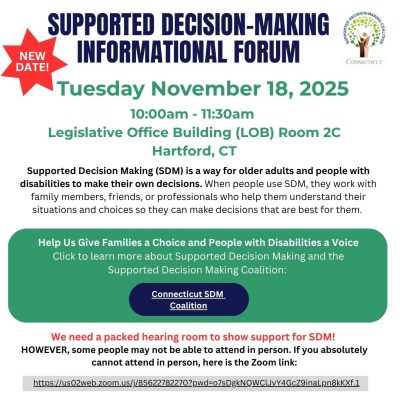On November 29, 1975, the Education for All Handicapped Children Act was signed into law. Today, this law, now known as the Individuals with Disabilities Education Act (IDEA), ensures all infants, toddlers, children, and youth with disabilities and their families have access to special education, related services, and early intervention that meet their needs.
Authorized under the Developmental Disabilities Assistance and Bill of Rights Act of 2000 (DD Act), the UConn UCEDD aims to assure that individuals with developmental disabilities and their families participate in the design of and have access to needed community services, individualized supports, and other forms of assistance that promote self-determination, independence, productivity, and integration in all facets of community life.
How the DD Act and IDEA Are Connected
Although the Developmental Disabilities Assistance and Bill of Rights Act (DD Act) and the Individuals with Disabilities Education Act (IDEA) are separate federal laws, they are deeply interconnected in purpose, history, and impact. Both were created to protect the rights of individuals with disabilities and ensure access to services that support full participation in community life.
1. Shared Core Values
Both laws are grounded in the belief that individuals with disabilities:
-
have the right to self-determination,
-
should be supported to live, learn, and participate in their homes and communities, and
-
must have access to services that are individualized, equitable, and culturally responsive.
2. Complementary Focus Areas
-
IDEA guarantees educational rights and access to specially designed instruction and early intervention for eligible infants, toddlers, children, and youth with disabilities.
-
The DD Act funds UCEDDs, Protection & Advocacy Systems, and DD Councils, which work to improve systems, strengthen training, and promote inclusive practices across the lifespan.
While IDEA focuses on service delivery within education systems, the DD Act focuses on system improvement, capacity-building, and ensuring rights and access across all community settings.
3. UCEDDs Bridge the Two
UCEDDs were established under the DD Act and play a major role in:
-
preparing the workforce that provides IDEA early intervention and special education services,
-
conducting research and evaluation that strengthens IDEA implementation,
-
supporting families who navigate IDEA rights and services, and
-
promoting inclusive policies that align with IDEA’s goals.
4. Reinforcing Each Other’s Mission
-
IDEA ensures that young children receive the early supports that promote development, learning, and future independence.
-
The DD Act ensures that individuals and families have access to lifelong supports, community inclusion, advocacy, and leadership opportunities.
Together, these laws form a coordinated federal commitment to helping individuals with disabilities thrive—from early childhood through adulthood.

